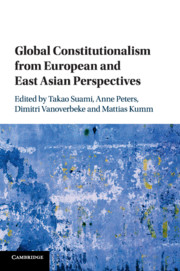Book contents
- Global Constitutionalism from European and East Asian Perspectives
- Global Constitutionalism from European and East Asian Perspectives
- Copyright page
- Contents
- Contributors
- Acknowledgments
- Global Constitutionalism from European and East Asian Perspectives
- Part I Groundwork
- Part II Pursuit of Common Values
- Part III Horizontal Interactions
- 9 Global Constitutionalism
- 10 Development Issues in the Discourse of Global Constitutionalism
- 11 A New Idea for Constructing the Global Legal Mechanism of the Right to Development
- 12 Fair Is Foul, and Foul Is Fair
- 13 Conceptualising Global Environmental Constitutionalism in a Regional Context
- Part IV Implementation and Enforcement
- Part V Conclusion: East Asia and Global Constitutionalism
- Index
12 - Fair Is Foul, and Foul Is Fair
The Mixed Character of Constitutionalism in the Global Economic Governance
from Part III - Horizontal Interactions
Published online by Cambridge University Press: 09 November 2018
- Global Constitutionalism from European and East Asian Perspectives
- Global Constitutionalism from European and East Asian Perspectives
- Copyright page
- Contents
- Contributors
- Acknowledgments
- Global Constitutionalism from European and East Asian Perspectives
- Part I Groundwork
- Part II Pursuit of Common Values
- Part III Horizontal Interactions
- 9 Global Constitutionalism
- 10 Development Issues in the Discourse of Global Constitutionalism
- 11 A New Idea for Constructing the Global Legal Mechanism of the Right to Development
- 12 Fair Is Foul, and Foul Is Fair
- 13 Conceptualising Global Environmental Constitutionalism in a Regional Context
- Part IV Implementation and Enforcement
- Part V Conclusion: East Asia and Global Constitutionalism
- Index
Summary
- Type
- Chapter
- Information
- Publisher: Cambridge University PressPrint publication year: 2018



